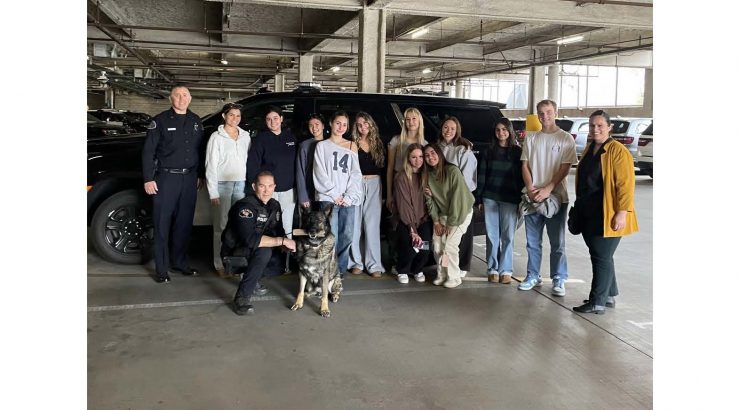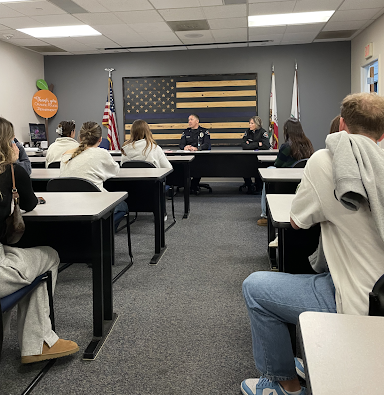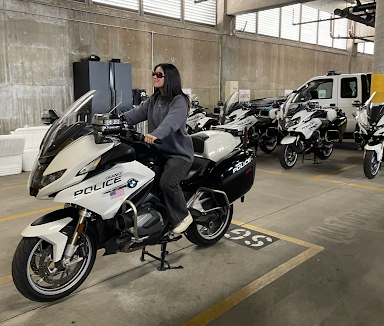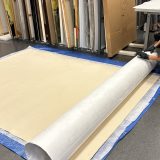
Experiential Learning: Orange Police Department and Chapman Public Safety
September 5, 2024
Students enrolled in the SOC 231 Foundations of Criminal Justice course last spring had the opportunity to visit the Orange Police Department (OPD). The experiential trip was a highlight of Dr. Nancy Rios-Contreras’ (Sociology) course, which covered topics relevant to police, courts, and corrections. Students learned criminology theories and contemporary social issues impacting the criminal justice system.

Lieutenant McMullin and Officer Panaggio answering student questions in the briefing room.
Lieutenant Phil McMullin, the Public Information Officer (PIO) for OPD, welcomed the Wilkinson students and provided an overview of the law enforcement profession. He gave the students an in-depth tour, ensuring they had a rich learning experience. Students sat in the briefing room, learned about O.C. pepper spray training, saw the police vehicle parking garage, went inside a holding cell, learned about narcotics, visited the gang unit, talked to homicide detectives, and learned about 911 dispatch. Most importantly, the students gained a wealth of knowledge about crime and policing in the City of Orange.

Sociology student Taylor Lee (’26) on an Orange Police Department motorcycle.
“I didn’t know just how much goes on behind the scenes at the police station,” said Leila Neet (‘26 Communication Studies, CCI minor) after the class visit.
Through this experiential learning opportunity, students met an officer responsible for recruitment who shared various career and internship opportunities with the students.
“For the Orange Police Department, I didn’t know the in-depth process of an arrest; from the 911 call, the communication toward the police officers, and the actual arrest itself,” said Amelia Mora (‘26 Psychology, Law and the Liberal Arts minor). “There are a lot of steps that go into an arrest even if it’s for a small crime. I didn’t know you had to have at least three years of patrol experience before training to become a K-9 officer. I learned new things about the police department. It made me appreciate them more since they go through very thorough steps to handle a specific crime correctly.”
Dr. Rios-Contreras also organized an experiential learning opportunity inside the classroom. She invited Public Safety Patrol Sergeant Josh Hinson to discuss what an active shooter response would look like at Chapman University. Students learned about shooting situations on college campuses, survival strategies, Public Safety response, Orange Police response, and Chapman University resources. Sergeant Hinson taught the students: RUN, HIDE, FIGHT!
The two experiential learning opportunities with the OPD and Chapman University Public Safety inspired students as they completed their community-engaged action projects. Student projects included interviews with a survivor of a violent crime, a survivor of sexual assault, a crime analyst, an employee of Casa de La Familia, a school counselor, a former employee of an adolescent residential rehabilitation facility, an individual with a DUI, and an individual that was arrested. Some students volunteered at the Orange County Rescue Mission and the Salvation Army. Action projects also included visits to Project Kinship, an Alcoholics Anonymous support group, a school board meeting, and the 9/11 Museum in New York City. Experiential learning allows students to apply sociological theory and expand their perceptions of justice in the classroom and the local community.
(Pictured above: Sociology students and Dr. Rios-Contreras meeting Officer Osborn and Police K-9 Wyatt)

